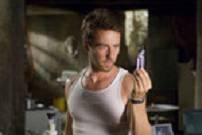|
|
||||
|
|
by Jeffrey Chen  Now that Marvel Comics has its own movie production arm -- called "Marvel Studios," of course -- they're calling do-overs on one of their more beloved properties, The Hulk. Apparently, they, along with many other movie watchers, didn't care for Ang Lee's 2003 adaptation, Hulk, which is both understandable and kind of a shame. The Hulk's premise has a simplicity that is, in my view, both a blessing and a curse. On the one hand, it's easy to relate to reacting to injustices with pure, utter rage, and it's cathartic to fantasize about acting that out. On the other hand, well, that's all there is to it -- purely a primal instinct and response. Lee saw the chance to try something different with Hulk, and went in a more artistic route, creating and developing character relationships and trying to say something meaningful about bottled up rage, its origins and aftermath. His movie was ambitious and cerebral, and it might've gone over better with general audiences had it been about a new character and not about The Hulk. This is because with The Hulk comes preset expectations -- that Hulk is supposed to smash. And smash he does in Marvel's reboot (and I think it's more of a reboot than a sequel, because it doesn't mention the previous movie's events and the character of Betty Ross reacts to Bruce Banner's transformation into The Hulk as if she's seeing it for the first time). The comic book company wants its movie to stay more on its original line this time, hiring action director Louis Leterrier to handle the destructive chaos. The result? A Hulk film that's far more traditional -- and one that takes advantage of the fact there was a previous Hulk movie, so it didn't have to be an origin story in any way. This approach also helps make The Incredible Hulk quite nostalgic as well -- for the original television series of the same name. References to the show are numerous and loving -- Lou Ferrigno, television's Hulk, gets a lengthy cameo and provides the screen Hulk's voice. The late Bill Bixby, the original Banner, even gets a cameo via footage from an old movie. The TV show's melancholy piano theme gets played, too, in the same manner it was used on the show, underscoring Banner's sad and lonely walks after his last rampaging transformation. The theme is expanded upon during the quiet relationship moments between Banner (Edward Norton) and Betty Ross (Liv Tyler) in Craig Armstrong's score. And the show's pattern of Banner traveling to new locations, turning into The Hulk, rampaging and then having to relocate gets reflected in the movie's script. It would almost be OK to call The Incredible Hulk a film adaptation of the TV show. But the comics are the source of the movie's driving narrative and characters. The U.S. government, led by General Ross (William Hurt), created The Hulk and are after Bruce Banner, one of its former scientific researchers, to detain and study him. Banner is on the run because he doesn't want The Hulk to become a weapon and is searching for a cure. In the meantime, he pines for Ross's daughter Betty, a fellow former researcher and lover. The movie is thus a chase story with the military cracking down on Banner's location, only to have him turn into The Hulk, destroy their equipment as if they were made of paper-mâché, and get away for another round. The story's general themes are intact, including paranoia against the government, fear of the military experimenting with biological weapons, and, of course, the catharsis and consequences that come with righteous, violent rage. Added to this mix is one of Hulk's arch-villains, Emil Blonsky (Tim Roth), whose strength-enhancements and lust for power eventually turn him into The Abomination. Oh, and we're even given a clue to the emergence of one other Hulk arch-enemy, just in case there's a sequel. The ensuing ride offers a lot of fun and, frankly, exactly what one would have expected from a Hulk movie. In this way, my feeling about it is similar to the way I felt about Christopher Nolan's Batman Begins. That movie also had a more offbeat predecessor, Tim Burton's Batman, which was artistically and psychologically more interesting. Nolan's movie is more give-'em-what-they-want and works well in the sense that it doesn't try anything crazy, stays the course, and simply delivers solidity in production values and acting. In other words, it's solid and safe. The same can be said about these Hulk movies -- Lee's version is more thoughtful, more interesting, but Leterrier's is solid and safe. I think you can't go wrong with either of them. (Released by Universal Studios and Marvel Studios; rated "PG-13" for sequences of intense action and violence, some fighting, sci-fi images, and brief suggestive content.) Review also posted at ww.windowtothemovies.com. |
||
|
© 2024 - ReelTalk Movie Reviews Website designed by Dot Pitch Studios, LLC |



